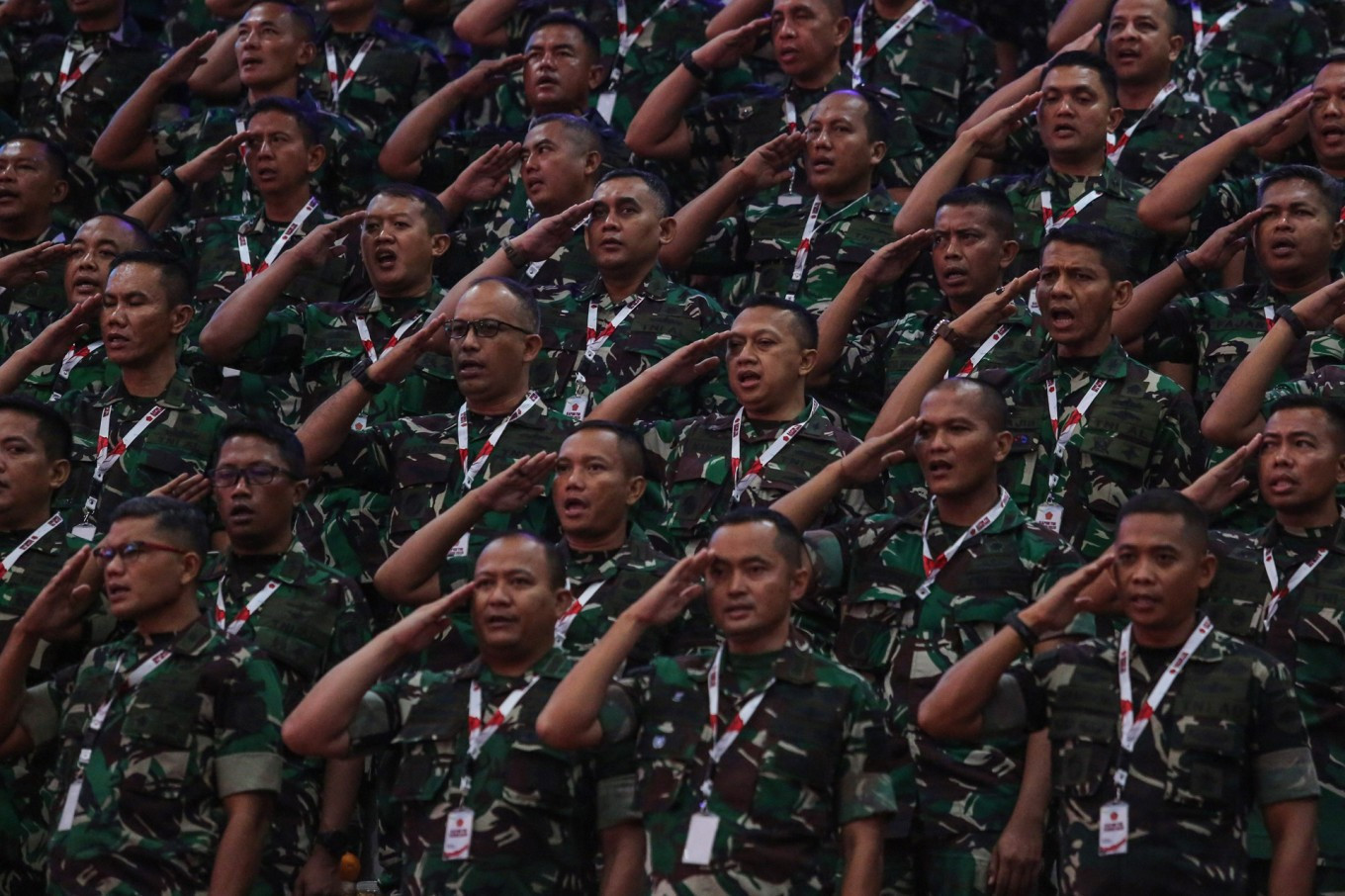News
Growing militarization a litmus test for Indonesian democracy
Tenggara Strategics April 9, 2025 High-ranking Indonesian Military (TNI) officers salute during the force's leadership meeting at the TNI headquarters in Jakarta on Jan. 31, 2025. (Antara/Asprilla Dwi Adha)
High-ranking Indonesian Military (TNI) officers salute during the force's leadership meeting at the TNI headquarters in Jakarta on Jan. 31, 2025. (Antara/Asprilla Dwi Adha)
Time has passed since the House of Representatives passed the revision of the controversial Indonesian Military (TNI) Law, leading to nationwide civic unrest. Demonstrators have demanded that the government reverse the bill that expanded the military's presence in civilian affairs. Although the resistance has spread widely, militarization in the country continues to grow alongside it.
According to the Indonesian Legal Aid Institute Foundation (YLBHI), protests have appeared in over 50 cities and regencies across the country since the revised TNI Law was discussed by the House, with at least 10 of them being met with violent responses by both the police and the military. “It looks like the protesters were brutally beaten, then abandoned, or even beaten even more brutally before being left behind,” Zainal Arifin, chair of the Advocacy Division at YLBHI, said.
While President Prabowo Subianto remains silent on the mass demonstrations, repression from the state apparatus appears to be his official stance. Law Minister Supratman Andi Agtas, however, insists that the law's revision was the House's initiative. The administration's lack of concern over the cries of its people and the nation’s rule of law reflects a reality of Indonesian democracy, where not only is it decaying, but it has long been breached.
The repressive approach toward political dissent perpetuates the trend of militarization that has shaped Prabowo’s presidency, silencing dissenters through oppression. Although the TNI Law now grants the military a greater role in civilian command, the former Army general has already turned the institution into his personal instrument to execute his national programs from the outset of his term.
With ambitious goals like the free nutritious meal program and food self-sufficiency, Prabowo has entrusted the military to not only silence critics, but also to play an active role in carrying out these goals. Military officials have been spotted administering meals to school children and monitoring crop production across the country to help ensure that Prabowo’s programs work. Analysts have rightly pointed out eerie echoes of the New Order when Prabowo’s former father-in-law and autocrat Soeharto wielded the military in much the same way.
The government had also appointed several high-ranking military officials to civilian posts long before the House deliberated the TNI Law revision. These include his aide-de-camp Lt. Col. Teddy Indra Wijaya as Cabinet Secretary, Maj. Gen. Novi Helmy as the president director of the State Logistics Agency (Bulog), Maj. Gen. Irham Waroihan as Inspector General of the Agriculture Ministry, Maj. Gen. Maryono as Inspector General of the Transportation Ministry, and Commodore Ian Heriyawan as an official at the Haj Organizing Agency. Notably, these roles remain outside the government institutions now permitted for active military officials, expanded from 10 to 14 under the revised TNI Law.
Additionally, Army chief of staff Gen. Maruli Simanjuntak and Adm. Muhammad Ali were given president commissioner positions in state-owned companies, breaching even the revised TNI Law as the military has long been barred from business practices since the reformation era erased this capacity following widespread abuses of power during the New Order era.
Demonstrators have also strongly opposed a clause in the revised law that expands the military’s role in digital surveillance, a move widely seen as yet another blow to the nation’s already fragile freedom of speech. Military representatives have claimed that they will not persecute dissent by citizens, merely targeting cyber threats that wish to cause national disintegration. This comes in conjunction with the planned revision of the National Police law, aimed at similarly broadening the force’s authority over digital investigations.
The expanded surveillance powers risk giving the state apparatus legitimate access to citizens' digital lives, with limited oversight to prevent potential abuses.
Although the TNI Law revision ultimately passed, pressure from civil society may have helped curb its most extreme provisions. Before the finalized revision, strong rumors suggested that it would initially include a clause allowing the President to appoint active military members to any government position if deemed necessary. This never materialized and instead, expansion was limited to only include four additional government institutions.
The public does not appear to be completely isolated, with political elites like former president Susilo Bambang Yudhoyono (SBY) maintaining a clear stance that active military officials should remain outside of political affairs. “If you're still an active general, for example, don’t engage in politics. If you want to enter politics, retire first,” the former Army general remarked.
Whether it was SBY’s remarks or mounting public resistance that ultimately forced concessions, authoritarianism continues to loom over Indonesia with militarization as the regime’s weapon of choice. With the Idul Fitri long holidays coming to a close, protests and the struggle toward maintaining the hard-won democracy in the country are set to resume. The question is how far they can go.
What we've heard
Prabowo's administration has been using House of Representatives Deputy Speaker Sufmi Dasco Ahmad as one of its key figures to ease civil society protests. A politician stated that Dasco initiated a meeting between civil society groups and the Working Committee on the Revision of the TNI Law in Commission I, which was then held behind closed doors. "But the discussion between the two sides did not go smoothly," the source said.

